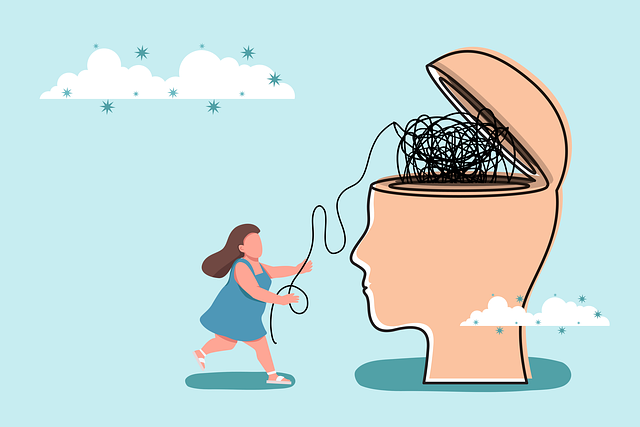Mental health issues among children, including anxiety, depression, and suicidal thoughts, are a growing concern. Early intervention through tailored therapy equips young minds with healthy coping mechanisms. Community outreach programs focused on mental health awareness educate parents, caregivers, and educators to recognize distress signs. Cognitive-behavioral therapy (CBT) is an effective method for suicide prevention, teaching skills to challenge negative thought patterns. Customized therapeutic interventions use strategies like mindfulness meditation to enhance emotional regulation. Engaging families and communities through workshops and training reduces suicide risks by normalizing mental health conversations and fostering a supportive ecosystem.
Mental wellness promotion is a multifaceted approach aimed at fostering healthy minds and emotions, especially among children. This article delves into critical aspects of enhancing mental health, including understanding common issues in children, the power of early intervention, and therapeutic strategies like suicide prevention tactics.
We explore evidence-based methods to build resilience, equip individuals with coping skills, and engage families and communities in long-term wellness solutions, emphasizing the significance of therapy for children’s well-being and suicide prevention.
- Understanding Mental Health Issues in Children
- The Role of Early Intervention and Support
- Therapeutic Approaches for Suicide Prevention
- Building Resilience and Coping Strategies
- Engaging Families and Communities for Long-Term Wellness
Understanding Mental Health Issues in Children

Mental health issues among children are becoming increasingly recognized as a significant concern in today’s society. It’s crucial to understand that young minds face unique challenges that can impact their overall well-being and development. Issues like anxiety, depression, and even thoughts of suicide are not uncommon among adolescents, highlighting the need for early intervention and support. Therapy plays a pivotal role in helping children navigate these difficulties; it provides them with essential coping mechanisms and empowers them to express their emotions healthily.
Implementing community outreach programs focused on mental health awareness can be transformative. These initiatives educate parents, caregivers, and educators on recognizing signs of distress and promote open communication strategies. By fostering a supportive environment where mental health is openly discussed, we can ensure children receive the help they need before issues escalate. This proactive approach, coupled with effective therapy, can significantly reduce the risk of suicide attempts and promote long-term resilience in children.
The Role of Early Intervention and Support

Early intervention plays a pivotal role in mental wellness promotion, especially when it comes to suicide prevention among children and adolescents. By identifying and addressing mental health issues at an early stage, we can significantly reduce the risk of severe outcomes. Therapy for children, tailored to their unique needs, is a powerful tool that fosters resilience and promotes healthy coping mechanisms. This proactive approach ensures that young individuals develop essential life skills and a strong sense of self-worth, acting as a buffer against future mental health crises.
Support systems, including mental wellness podcast series production and community outreach programs, can further enhance these efforts. Encouraging open conversations about mental health and providing accessible resources, such as self-care practices, can help normalize the topic. This, in turn, enables young people to seek assistance without stigma, ensuring their well-being is nurtured and supported from a tender age.
Therapeutic Approaches for Suicide Prevention

Suicide prevention among children requires a multi-faceted approach that combines various therapeutic strategies. One effective method is cognitive-behavioral therapy (CBT), which helps young individuals identify and challenge negative thought patterns and behaviors contributing to suicidal ideation. CBT equips children with coping skills, promotes problem-solving abilities, and fosters resilience against distressing emotions.
Additionally, empathy building strategies play a crucial role in therapeutic interventions. Healthcare providers trained in cultural competency enhance the effectiveness of these sessions by demonstrating cultural sensitivity in mental healthcare practice. This involves understanding and respecting a child’s background, beliefs, and experiences, which can significantly impact their mental wellness. Such training allows for personalized care, building trust and fostering open communication, ultimately contributing to improved suicide prevention outcomes.
Building Resilience and Coping Strategies

Building resilience is a key component of mental wellness promotion, especially for children who are vulnerable to various stressors and challenges. Through therapy, young individuals can learn effective coping strategies to navigate life’s difficulties. Techniques such as mindfulness meditation have proven beneficial in enhancing emotional regulation and fostering mental strength. By integrating these practices into their daily routines, children gain tools to manage stress, anxiety, and even prevent suicide-related thoughts, thereby improving their overall well-being.
The development of coping skills is a multifaceted process that considers individual needs and cultural sensitivities in mental healthcare practice. Customized interventions can empower children to express and process emotions healthily. Cultural sensitivity ensures that therapeutic approaches are inclusive and respectful of diverse backgrounds, enabling better engagement and positive outcomes. This holistic approach to mental wellness encourages resilience-building and equips individuals with lifelong coping mechanisms.
Engaging Families and Communities for Long-Term Wellness

Engaging families and communities is a pivotal strategy for promoting long-term mental wellness, especially in addressing issues like therapy for children and suicide prevention. When supported by a strong community network, individuals are more likely to seek help early on, fostering an environment where open conversations about mental health become normalized. This collective approach ensures that not only children but also their caregivers gain access to essential resources, education, and support systems tailored to their cultural needs.
Community initiatives can involve hosting workshops on topics like mindfulness meditation and stress reduction methods, integrating these practices into everyday life. Healthcare provider cultural competency training is another vital component, ensuring professionals are equipped to offer empathetic, culturally sensitive care. By empowering communities with knowledge and tools, such as understanding the impact of social determinants of health, we can create a more supportive ecosystem for mental wellness, ultimately reducing risks associated with suicide and enhancing overall well-being.
Promoting mental wellness in children involves a multi-faceted approach, from understanding and early intervention to building resilience and engaging families. By implementing therapeutic strategies tailored to children’s needs, such as those focused on suicide prevention, we can foster healthier minds. Building community support and equipping families with coping tools is key to long-term well-being. Through collaborative efforts, we can create a more resilient and supportive environment for every child.











